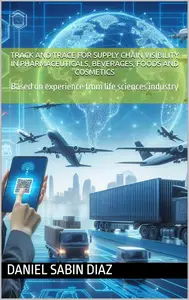
Free Download Track and Trace for Supply Chain Visibility in Pharmaceuticals, Beverages, Foods and Cosmetics: Based on experience from life sciences industry by Daniel Sabin Diaz
English | August 6, 2024 | ISBN: N/A | ASIN: B0DCGG498Y | 83 pages | EPUB | 2.31 Mb
The purpose of this book is to help you understand what it means to implement a traceability system across different industries. The target audience includes decision makers, managers, technicians, and engineers from companies considering the implementation of a track and trace system. While this is not a technical manual, it provides the foundational elements needed to understand the basics and participate in decision-making discussions.
Traceability is expected to become a standard across most industries within a few years. Strategic products related to human and animal health, those subject to government taxes, and high-value items will be the first to adopt these systems. This book combines knowledge and experience from the life sciences industry to facilitate a smooth transition to other sectors.
Companies are facing economic losses and brand reputation issues due to counterfeiting and diversion in the supply chain. The term "diversion" sometimes referred to as parallel market or gray market encompasses various issues such as trans-shipment, promotional bulk purchases, smuggling (illegal importation of products), unauthorized distributors, expired resales, free sample diversion, and theft.
Counterfeiting is a critical issue as well. Counterfeit products cost the global economy over $500 billion annually. These fake products are challenging to detect, even for experts.
Another area where traceability can be beneficial is in managing recalls, which involves retrieving defective and/or potentially unsafe goods from consumers.
In recent times, sustainability and efforts to reduce carbon footprint have gained importance. Track & trace systems can contribute to protecting the planet and mitigating climate change. Reducing transportation distances will be key for optimizing the supply chain.
Brand owners are expected to invest in track & trace systems. The issues previously discussed, combined with new trends driven by AI, improvements in software integration, and the availability of insightful data, will drive the growth of track & trace systems.
The book is organized into chapters. After the introduction, the second chapter will cover serialization concepts, followed by a chapter on track & trace concepts, which form the foundation of the subject. The fourth chapter will discuss elements related to the standards that are primarily used.
Serialization and track & trace regulations in different locations will be covered in the next chapter, including:
* FMD-EU (Falsified Medicines Directive - European Union)
* DSCSA-FDA (Drug Supply Chain Security Act - U.S. Food and Drug Administration)
* US FDA Food Safety Modernization Act (FSMA)
* Russia Centralized Track and Trace System
* China Medicine Regulation
* EU Wine Regulation
* ANVISA (Brazilian Health Regulatory Agency), etc.
Several industry questions often arise regarding the necessity of installing vision inspection systems to enable a track & trace solution and chapter six will be dedicated to this.
Another chapter will focus on the fact that most providers concentrate either on raw materials or products post-manufacturing. The ideal system should encompass details for tracking both before and after manufacturing.
The subsequent chapter will address new trends and technologies that are emerging rapidly, presenting significant opportunities to enhance serialization and track & trace.
Chapters nine through eleven will be dedicated to use cases for beverages foods, and cosmetics, respectively, detailing the challenges and solutions, including architectures and process flows.
The most crucial chapter is chapter twelve, which outlines key elements for a successful project. This will be highly beneficial for project managers and leaders, providing insights into the most important aspects during project phases.
